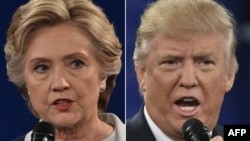The Turkish president's head of international relations says next week's U.S. presidential elections is an opportunity to reset deeply strained relations over the Syrian civil war and demands for the extradition of Islamic cleric Fethullah Gulen, who is blamed for July's failed coup.
Washington and NATO ally Turkey have been at loggerheads over President Barack Obama's policy of not militarily intervening in the Syrian civil war.
Turkish President Recep Tayyip Erdogan's head of international relations, Ayse Sozen Usluer, said next week's U.S. presidential election is an opportunity for a change in policy.
"We are seeing the weakness of the Obama administration for a long time, for solving the problems of the region, especially in regard to the Syrian war," she said. "When we talk with the European leaders or leaders of regional powers, everybody says that we need the United States to maintaining peace in the region. That is why we expect a strong leadership from the United States."
Turkey hosts more than three million Iraqi and Syria refugees at a cost it claims to exceed $10 billion. Washington has rejected calls by Ankara to militarily support the creation of safe havens in Syria to allow some refugees to return.
Usluer believes the next U.S. president could be more receptive to its call.
"We are expecting from the new president stronger policies to be pursued in the region," she said. "In what ways, first of all in creating a safe zone in Syria."
But the main point of tension in U.S.-Turkish relations is Ankara's call for the extradition of the Islamic cleric Fethullah Gulen, who lives in self-imposed exile in Pennsylvania. Gulen is accused by Turkish prosecutors of leading a terrorist organization called FETO, which it says instigated July's failed coup attempt in Ankara.
Gulen denies the charges. Washington argues Gulen's extradition is a matter for the courts. But Ankara accuses Washington of failing to comply with its extradition agreement. Usluer said the issue will top the agenda, with the new president.
"Obviously U.S.-Turkish relations are in turbulence. But turbulence can be a short period, which can be passed through," she said. "I believe if the U.S. authorities will show sincere cooperation and sincere understanding of Turkish concerns about FETO and why we want Fethullah Gulen himself be returned to Turkey.Turkish-U.S. relations can be much better easily."
With war raging across its southern border and strained diplomatic ties with Europe and many of its neighbors, Ankara is banking on whoever wins the U.S. presidential election to give it the opportunity to reset relations with its most powerful ally.









